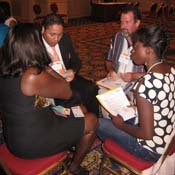Tuesday, August 16, 2011
It's getting close to the end of the month, and the "Chen" family is trying to decide which bills they can afford to pay. The utility company tells them their phones and electricity are about to be shut off. They try negotiating.
"Can I get an extension? I can only give you $50. My mortgage is due; my wife is the only person working. I can pay $50." The utility company agrees to keep the electricity on, but the family loses their phone service.
The "Chens" were part of a poverty simulation held Monday in Jackson. Participants were assigned scenarios based on the situations of real-life families. They spent an hour and a half experiencing some of the frustrations that people living on a low income or in poverty routinely face--not being able to find work, running out of food and not knowing which agency to go to for help. Stations representing grocery stores, pawn shops, relief agencies and prisons lined the edges of the room where the simulation took place, while a "criminal influence" tried to convince people who had lost their jobs to sell drugs for him.
Linda Barnes is the manager of low-income systems for Entergy, which helped organize the event.
"This afternoon, you'll go home," she told participants after the poverty simulation was over. "You'll have plenty to eat; you probably won't have to worry about paying your rent. You're going to be very comfortable. But for 39 million Americans, that is not the case."
"Charles Chen," whose real name is Barbara Tolliver, said her "month" was very frustrating.
"I had been employed, my wife eventually lost her job, the children were stressed because we were stressed and it was hectic," she said.
Entergy Mississippi hosted the poverty simulation as part of the annual conference of the Mississippi Association of Community Action Agencies. People from Entergy, legislators and agencies that work with the poor participated. After the poverty simulation was over, people talked about the frustrations of trying to pay bills, buy food and make sure the children get to school without enough money. They also discussed ways to more effectively get people living on low incomes the help they need.
Several people from relief agencies said the simulation helped them have more understanding and compassion for the people they work with. One man, who acted as a police officer in the simulation, said he understands now how difficult it must be for police officers to have to take teens to jail over and over again.
Lawanda Formisano, a board member with Pearl River Valley Opportunity, emphasized the need to treat all people with dignity and respect.
"We can step it up a notch and be kinder and more gentle and bless people as they go about their business," she said.
Previous Comments
- ID
- 164559
- Comment
Where are they? A Great Gatsby concert? If that is poverty, I'll have what Nic Lott is having.
- Author
- jbreland
- Date
- 2011-08-17T07:42:19-06:00
- ID
- 164571
- Comment
This is the kind of simulation that I would like to see occur in High School classes - along with how to manage a budget, manage credit, maintain good credit rating, recover from a disaster and other life management courses. One class per year for four years. It would sure beat 'study hall' type periods. Its great that some kids have two successful parents at home teaching them how to be successful by example. Some kids are just not that lucky, but they all deserve a chance at a better future.
- Author
- BobbyKearan
- Date
- 2011-08-17T11:01:37-06:00
- ID
- 164575
- Comment
I feel you Breland. I don't quite get the concept. I appreciate people trying to understand the plight of the poor, but do we really need "simulators" to evoke empathy and compassion. Poverty is a complex issue that consists of more than just making ends meet at the beginning, middle and end of the month. It involves a whole lot of public policy, racial history, predatory capitalists, and a whole lot more.
- Author
- dd39203
- Date
- 2011-08-17T11:30:05-06:00
- ID
- 164576
- Comment
And the most appropriate way to "respect" poor people would be to pay a living wage for an honest days work.
- Author
- dd39203
- Date
- 2011-08-17T11:34:53-06:00

Comments
Use the comment form below to begin a discussion about this content.
Sign in to comment
Or login with:
OpenID